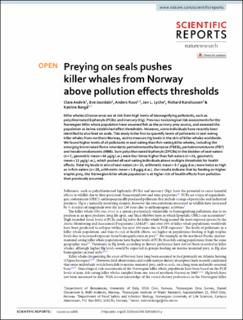| dc.description.abstract | Killer whales (Orcinus orca) are at risk from high levels of biomagnifying pollutants, such as polychlorinated biphenyls (PCBs) and mercury (Hg). Previous toxicological risk assessments for the Norwegian killer whale population have assumed fish as the primary prey source, and assessed the population as below established effect thresholds. However, some individuals have recently been identified to also feed on seals. This study is the first to quantify levels of pollutants in seal-eating killer whales from northern Norway, and to measure Hg levels in the skin of killer whales worldwide. We found higher levels of all pollutants in seal-eating than fish-eating killer whales, including the emerging brominated flame retardants pentabromoethylbenzene (PBEB), pentabromotoluene (PBT) and hexabromobenzene (HBB). Sum polychlorinated biphenyls (ΣPCBs) in the blubber of seal-eaters (n = 7, geometric mean = 46 µg/g l.w.) were four times higher than fish-eaters (n = 24, geometric mean = 11 µg/g l.w.), which pushed all seal-eating individuals above multiple thresholds for health effects. Total Hg levels in skin of seal-eaters (n = 10, arithmetic mean = 3.7 µg/g d.w.) were twice as high as in fish-eaters (n = 28, arithmetic mean = 1.8 µg/g d.w.). Our results indicate that by feeding on higher trophic prey, the Norwegian killer whale population is at higher risk of health effects from pollution than previously assumed. | |
